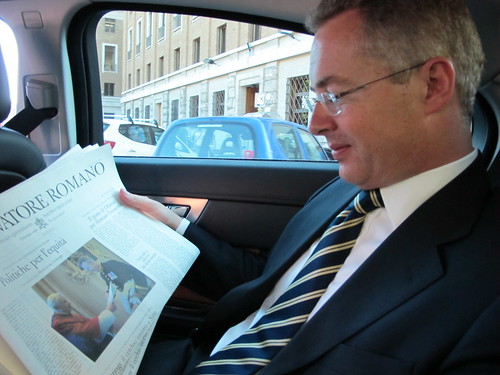18th May 2012
I.O.R.

The acronym stands for “Istituto per le Opere di Religione”, or Institute for Religious Works. A typical Pontifical Institution, you might think, running standard charitable activities on behalf of good causes.
Well, the I.O.R. does that too. But it is better known, if misleadingly, as “the Vatican Bank”. This week, Ambassadors accredited to the Holy See were invited in to learn more about the Institute, and see the I.O.R. for themselves.
Mention the Vatican Bank and Dan Brown, Roberto Calvi and the Banco Ambrosiano spring to mind. But remember that Calvi died 30 years ago – I was 16 at the time! What was valuable about the briefing was to hear just how much the I.O.R., under new and professional management, has been doing in its efforts to open itself up to the same transparent norms required of other financial institutions.
Pope Benedict has said that Papal institutions must demonstrate an exemplary degree of transparency. Over the last year, new regulations have been put in place, governance tightened, and teams from the Council of Europe’s Committee of Experts on the Evaluation of Anti-Money Laundering Measures and the Financing of Terrorism (MONEYVAL) invited in to advise the I.O.R. and other institutions of the Vatican that manage money on how to meet their international transparency and compliance obligations. This is a process my government supports.
We know from the UK that even the most reputable banks and financial institutions are vulnerable to misuse as conduits for managing the proceeds of terrorism, laundering money from crime, and hiding tax evasion. Loopholes must be closed. A great deal of attention is being paid to this issue internationally. The Holy See’s reputation depends on it being able to show that the Vatican’s own such institutions are as transparent and resistant to abuse as possible. The process of getting there will no doubt generate headlines, reminding us of events 30 years ago. Plenty still needs to be done. But the Holy See needs to stick to its guns. It is in their interest, and ours.
The Vatican is corrupt as is British Government. Period.